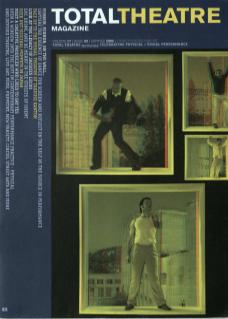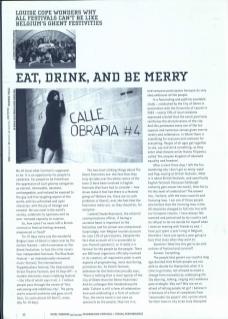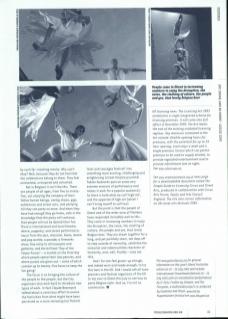We all know what Carnival is supposed to be. It is an opportunity for people to celebrate. For people to be freed from the oppression of such gloomy categories as eternal, immovable, absolute, unchangeable, and instead be exposed to the gay and free laughing aspect of the world, with its unfinished and open character, with the joy of change and renewal. We can revel in the world’s variety, celebrate its openness and its ever-renewed capacity to surprise.
So, how come I’ve never left a British carnival or festival feeling renewed, empowered or freed?
For ten days every July the wonderful Belgian town of Ghent is taken over by the Gentse Feesten – which translates as the Ghent Festivities. In fact this title covers four independent festivals: the Blue Note Festival – an internationally renowned music festival, the International Puppetbuskers Festival, the International Street Theatre Festival, and 10 Days Off – a modern electronic music/clubbing festival, the title of which says it all. 1.7 million people pass through the centre of this ‘welcoming and rebellious city’. The party starts around lunchtime and goes on till 3am (in some places till 8am!), every day for ten days.
The two most striking things about the Ghent Festivities are: the fact that they truly do take over the whole centre of the town (I have been involved in English festivals that have had to consider – how do we make it feel like there is a festival going on? Believe me, there are no such problems in Ghent); and, the fact that the festivities really are, as they should be, for everyone.
People come to Ghent in increasing numbers to enjoy the disruption, the noise, the clashing of culture, the people and yes, that lovely Belgian beer.
I asked Claude Beernaert, the external communications officer, if having a socialist heart is important to the festivities and his answer was unequivocal. Surprisingly, non-Belgian tourists account for only 11% of participants (despite the fact that so much of it is accessible to non-Flemish speakers), so it really is a festival for the people by the people. There are 380 local organisers officially involved in its creation, all required to pitch in with aspects of programming, noise monitoring, promotion, etc. As Daniel Termont, alderman for the Festivities proudly says, ‘There is nothing that is more typical of the City of Ghent than the Ghent Festivities.’ And his colleague Wim Vandendriessche adds, ‘Culture is still a form of celebration here and celebrating is a form of culture.’ Thus, the entire event is not seen as spectacle by the people; they live in it, and everyone participates because its very idea embraces all the people.
In a fascinating and publicly available study – conducted by the City of Ghent in association with the University of Leuven in 2003 – nearly 75% of local residents expressed a belief that the event positively reinforces the attractiveness of the city. And this permeates every one of the ten squares and numerous venues given over to revelry and celebration. In Ghent there is something for everyone and someone for everything. People of all ages get together to see, say and drink something, as they enter what theatre writer Halina Filipowicz called ‘the utopian kingdom of absolute equality and freedom’.
After a mere three days I left the fun wondering why I don’t get so misty-eyed and flag-waving at British festivals. What is it about British festivals, and specifically English festivals (because Edinburgh certainly gets nearer the mark), that fail to hit this level of celebration? The answer lies, I believe, with the town councils and licensing laws. I am one of those people who believe that the licensing laws in the UK should be changed to fall into line with our European cousins. I have always felt nannied and patronised by my country and its refusal to let me decide for myself when I want an evening with friends to end. I have just spent a year living in Belgium, therefore I have just spent a year going to bars that close when they want to.
Question: What has this got to do with notions of festival and carnival?
Answer: Everything.
The people that govern our country long ago decided that British people are not able to decide for themselves when it is time to go home; not allowed to make a change from normality by celebrating life (by dancing, talking, singing, etc) outdoors past midnight. Why not? Why are we so afraid of letting people let go? I believe it is because of a fear of complaints from ‘reasonable tax payers’ who cannot stand for their town or city to be truly disrupted by such far-reaching revelry. Why can’t they? Well, because they do not feel that the celebrations belong to them. They feel uninvolved, uninspired and uninvited.
But in Belgium it isn’t like this. There are people of all ages, from five to ninety five, out enjoying the company of their fellow human beings, seeing shows, gigs, exhibitions and street acts, and partying till they can party no more. And when they have had enough they go home, safe in the knowledge that the party will continue, that people will not be denied their fun. There is international and local theatre, dance, puppetry, and street performance; music from the jazz, classical, blues, dance and pop worlds; a parade; a fireworks show; free entry to all museums and galleries; and the brilliant ‘Day of the Empty Purses’ – a market on the final day where people spend their last pennies, and where purses are given out – some of which contain up to twenty-five Euros to keep the fun going!
The focus is on bringing the culture of the people to the people, but the City organisers also work hard to introduce new types of work. In fact Claude Beernaert talked about a conscious effort to evolve the festivities from what might have been perceived as a more stereotypical Flemish ‘beer and sausages festival’ into something more exciting, challenging and enlightening (street theatre promoter Fabien Audooren puts on some very extreme versions of performance and makes it work for a popular audience). So there is both what we call ‘high art’, and the opposite of high art (which I can’t bring myself to call low).
But the point is that the people of Ghent and of the wider area of Flanders have responded incredibly well to this. They come in increasing numbers to enjoy the disruption, the noise, the clashing of culture, the people and yes, that lovely Belgian beer. They are drawn together for a long, and yet painfully short, ten days off to step outside of normality, celebrate the immortal and indestructible character of humanity, and, well, frankly – stay out late.
And I for one feel grown-up enough, and indeed worn and needy enough, to try this here in the UK. And I would ask all town planners and festival organisers of the UK to nip over to Ghent this July to see how to party Belgian style. And no, I’m not on commission.
See www.streetartsnetwork.org.uk news page for a downloadable document called The Simple Guide to Licensing Circus and Street Arts, produced in collaboration with Circus Arts Forum, Equity and Arts Council England. The site also carries information on UK street arts festivals 2005.
See www.gentsefeesten.be for general information on this year’s Ghent Festivities, which run 16-25 July 2005 and include: Internationaal Straattheaterfestival 20-25 July 2005 with art installations/performances by A-Tipis; Confins by llotopie; and The Ferryman, a multimedia project co-produced by Eunetstar and Piloot. www.istf.be
For Puppetbuskers festival see www.eftegent.be


